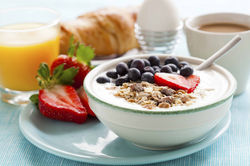Balanced Diet
For the body to function properly it requires good nutrition and a balanced diet that can provide it with the necessary energy, vitamins and minerals. Without a balanced diet and correct nutrition the body can become prone to disease, sickness and fatigue.
Energy
Kilojoules are a unit of measuring energy in food. Although energy is not a nutrient, it is a vital element in ones diet.
The number of kilojoules in food is determined by the amount of energy it contains. Kilojoules are important as they give you the energy you need to survive every day. The kilojoules in the food you eat transfer energy into your body so you are able to breathe, walk, talk and do everything else that relies on body movement.
Different people require different amounts of energy per day depending on their age, gender and physical activity level, but on average, one should consume around 8700 kilojoules a day. It is important that you don’t excessively exceed your daily kilojoule requirements because if you consume too much energy each day your body will not be able to metabolize it and it will be stored as fat.
If you would like to find out how much energy your body needs, click here to calculate your daily kilojoule requirement.
Energy can be found in all food but it is important to source your energy from food that has nutritional value rather than unhealthy foods that will not benefit your body. To achieve a balanced diet your daily kilojoule intake should come from a variety of whole grains, proteins, vegetables and fruits.
Carbohydrates
Carbohydrates are starches and sugars that provide the body with energy to perform daily tasks.
There are two types of carbohydrates, Simple and Complex.
Simple carbohydrates are sugars that give your body a quick energy boost. These carbohydrates are digested faster and are commonly found in foods high in sugar. Some of these foods include lollies, juice, and cookies.
Complex carbohydrates are starches which give your body a longer lasting and more sustainable energy source. These carbohydrates take longer to digest and provide your body with more energy. Potatoes, beans and rice are all starches that provide the body with the energy it requires.
Protein
Proteins are an energy source made up of amino acids that assist the body to grow and repair itself. Good sources of protein are meat, cheese, fish and milk.
Fat
Fat is another source of energy but unlike complex carbohydrates, it should not be consumed too frequently. Fat is needed as it insulates the body and protects your organs and joints. Although the body requires fat, it is important not to consume large amounts of it as it can increase your body weight and even cause heart disease.
5 Food Groups
To maintain a balanced diet your energy you need to base your meals and snacks on the 5 food groups. These groups are:
-Vegetables and Legumes
-Fruit
-Grains, cereals, rice and pasta
-Meat, fish, poultry, eggs and nuts
-Milk, yoghurt and cheese
To maintain a balanced diet women aged 19 to 50 should eat around 6 servings of grains, cereals, rice and pasta, 5 servings of vegtables and legumes, 2 servings of fruit, 2 ½ servings of milk, yoghurt and cheese, and 2 ½ servings of meat, fish, poultry, eggs and nuts daily.
As well at this, it is important to drink plenty of water throughout the day.
 Stalks of Wheat |
|---|
 Raspberries |
 Asparagus |
 Freshly Baked Muffins |
 Super Health Food |
 protein.jpg |
 Bowl of Berries |
 vegetable1.jpg |
 Ham, Salami and Cheese Board |
 Mixed Greens |
 tumblr_nnh9qlB9R91s2756fo1_400.jpg |
 tumblr_luzj9ojifQ1qcu3sto1_500.jpg |
 tumblr_m5lnelDiAs1r92xqj.jpg |
 tumblr_mh2ii8aXlm1s48a1io1_500.jpg |
 foods_protein.jpg |
 vegetables.jpg |
 Edited Image 2015-5-8-19:42:12 |
 |  |  |  |
|---|---|---|---|
 |  |  |  |
 |  |
"There is no better
time than now
to start eating healthy. "
